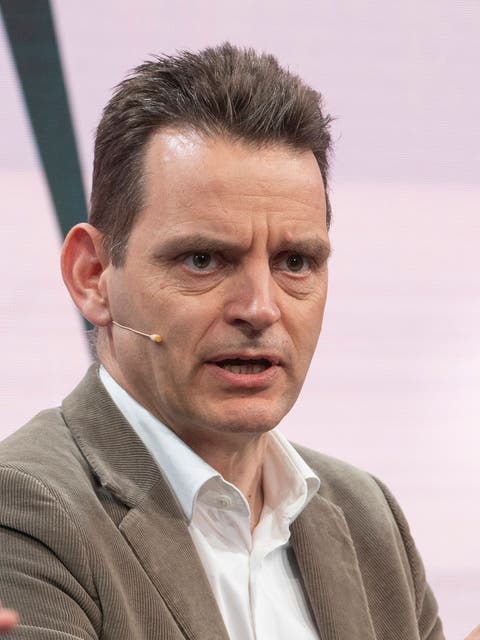ST.GALLEN SYMPOSIUM
The energy transition as a business? “You can’t do business on a dead planet,” says the African activist
Climate change is good business, E.On boss Leonhard Birnbaum and hydrogen entrepreneur Marco Alverà are sure. Meanwhile, Ugandan climate activist Vanessa Nakate made it clear: It’s not about business, it’s about people. Because the poorest have been feeling the effects of climate change for a long time.
The panel on geopolitical disruption and the energy transition with moderator Ryan Chilcote (from left), Leonhard Birnbaum, Vanessa Nakate and Marco Alverà.
How important energy is for the functioning of the modern world has probably become clearer than ever over the course of the past year. “Today, every company has to be an energy company,” said Marco Alverà on the panel on geopolitics and the energy transition at the St.Gallen Symposium. The Italian is CEO of TES-H2, a company aiming to power the economy with green hydrogen, a technology that’s been getting more attention in recent months – after all, H2 replace some fuel.
The reason for the attention is tragic: Russia’s invasion of Ukraine has just upset Europe’s energy market, which has long relied on Russian oil and gas. In this country, this has led to a boom in solar systems and heat pumps. Nevertheless, the representatives of the energy industry are not sure whether the war will really accelerate the energy transition. In the short term, he’s definitely bad, says Alverà. “Coal has increased again,” he says. “We were lucky with a warm winter.” In the long term, however, he is more optimistic. In comparison, renewable energies have become more economical.
Ukraine affiliated

Leonhard Birnbaum, CEO of the German energy group E.On.
But Leonhard Birnbaum, CEO of German energy infrastructure giant E.On, is also more pessimistic about the longer term. “Because of the increased prices, people don’t have the money to invest in the energy transition,” he fears. But he also sees rays of hope. Efforts to connect Ukraine to the European network have been accelerated. Only old equipment is still being sent there, “and we hope that it will survive as long as possible”. But that is the prerequisite for the energy transition to take hold in Ukraine, said Birnbaum. “Because she has the best prerequisites.”
Because it is clear to both of them: “The energy transition will come, because it is good business,” as Alverà put it. “But it could be ten years too long.” That’s why he relies on building the solar systems where the sun shines, and in large quantities. In Africa, for example – in order to then use it to produce cheap, green hydrogen that could be pumped to Europe.
Against green colonialism

The Ugandan climate activist Vanessa Nakate.
One of the moments when Vanessa Nakate, the Ugandan climate activist, acted as a spoilsport. “Green colonialism must not be the solution,” she reassured the other two. “South of the Sahara, 600 million people have no electricity at all.” Mostly the same people who suffer directly from the overexploitation of natural resources – whether it’s oil or raw materials for solar systems. They are also “who are already at the forefront of climate change” because the country can no longer feed them. The energy transition is not about business, it is about the planet and the people who live on it. “Because you can’t do business on a dead planet.” Again and again she earned applause.
Only, saving the world is not that easy, said Birnbaum. In order to achieve the energy transition, the grid infrastructure would have to be expanded – massively. But there are too many permits to be obtained and too many objections to be dealt with. “We have to save the world, but I can’t even expand the power grid in Bavaria.”
